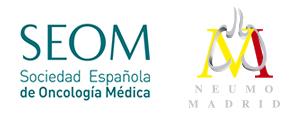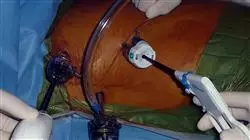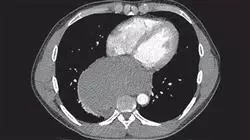University certificate
Scientific endorser

The world's largest faculty of medicine”
Description
Nowadays, molecular biology is key in the diagnosis and treatment of cancer, and has gone from being a field of research to an essential tool in the management of oncology patients"

Nowadays, talking about oncology means talking about "multidisciplinary teams", about advances in fields of science that are increasingly involved, and this, apart from being interesting, requires continuous specialization that is often difficult to acquire in other programs or congresses since they are oriented to a very specific area and related to a single specialty. In fact, one of the skills that TECH aims for students to achieve with this professional master’s degree is to have a broad and clear vision of oncology and to use the comparison of scientific advances in each area as a tool that will allow them to advance in knowledge.
The professional master’s degree in Thoracic Oncology will allow you to acquire knowledge that will be extremely useful in your daily practice based on critical work, a simple exposition and an effective methodology. For this purpose, TECH provides you with a faculty of professors who are in the first division in the management of cancer, and many leaders at an international level, who have prepared each topic in depth, from their vision and with the simplicity required to explain the subject to another specialist. Moreover, they always bear in mind that the ultimate goal of the program is that the knowledge can be acquired by any physician interested in thoracic tumors.
Finally, and with this eagerness to understand that knowledge, when it flows and nourishes all branches, allows great advances to be achieved, this program will help increase the potential of graduates thanks to the collaboration with other professionals and the revolutionary e-learning methodology.
Update your knowledge through the program in Thoracic Oncology”
This professional master’s degree in Thoracic Oncology contains the most complete and up-to-date scientific program on the market. The most important features include:
- Development of more than 75 clinical cases presented by experts in Thoracic Oncology
- The graphic, schematic, and practical contents with which they are created provide scientific and practical information on the disciplines that are essential for professional practice
- Diagnostic-therapeutic developments in assessment, diagnosis, and intervention in Thoracic Oncology
- Practical exercises where the self-assessment process can be carried out to improve learning
- Iconography of clinical and diagnostic imaging tests
- An algorithm-based interactive learning system for decision-making in the clinical situations presented throughout the course
- Special emphasis on evidence-based medicine and research methodologies in Thoracic Oncology
- All of this will be complemented by theoretical lessons, questions to the expert, debate forums on controversial topics, and individual reflection assignments
- Content that is accessible from any fixed or portable device with an Internet connection
This professional master’s degree may be the best investment you can make when selecting a refresher program, for two reasons: in addition to updating your knowledge in Thoracic Oncology, you will obtain a qualification endorsed by TECH Global University"
The teaching staff includes professionals from the field of Thoracic Oncology, who contribute their experience to this program, as well as renowned specialists from leading scientific societies..
Thanks to its multimedia content developed with the latest educational technology, it will allow the professional a situated and contextual learning, that is to say, a simulated environment that will provide an immersive education programmed to learn in real situations.
This program is designed around Problem-Based Learning, whereby the physician must try to solve the different professional practice situations that arise throughout the program. For this purpose, the physician will be assisted by an innovative interactive video system developed by renowned experts in the field of Thoracic Oncology with extensive teaching experience.
This program offers the opportunity to learn in simulated environments, which provides an immersive learning experience designed to prepare for real-life situations"

It includes clinical cases to bring the program's content as close as possible to the reality of medical care"
Objectives
The program in Thoracic Oncology is aimed at facilitating the performance of physicians dedicated to the treatment of Thoracic Oncology.

This program is designed to help you update your knowledge in Thoracic Oncology, with the use of the latest educational technology, to contribute with quality and confidence to decision-making, diagnosis, treatment, and patient support”
General Objective
- Create a global and up-to-date vision of Thoracic Oncology and all its aspects, allowing the student to acquire useful knowledge and at the same time, generate interest in expanding the information and discovering its application in their daily practice
Specific Objectives
Module 1. Etiology, Prevention and Screening
- Analyze the effectiveness of different tests proposed for lung cancer screening: low-resolution helical computed tomography, chest radiography and sputum cytology in the early diagnosis of lung cancer
- Define the potential of other screening tests and estimate the population susceptible to be screened for lung cancer
- Gain up-to-date knowledge in the molecular biology of cancer, especially in relation to the concept of genetic heterogeneity, circulating biomarkers and tissue molecular markers
Module 2. Translational Oncology
- Provide and expand knowledge on immunotherapy, as an example of a clear scientific advance in translational research, and one of the most promising lines of research in cancer treatment
- Create a global and updated vision of the exposed topics that will allow the student to acquire useful knowledge and at the same time, generate interest in expanding the information and discovering its application in their daily practice
- Define the potential of other screening tests and estimate the population susceptible to be screened for lung cancer
Module 3. Diagnosis and Staging
- Review the performance and usefulness of each of the tests used in the diagnosis of thoracic tumors
- Describe the usefulness and performance of PET/CT with F18-FDG in the diagnosis, staging, treatment control and monitoring of thoracic tumors
- Learn more about thoracic MRI since it provides very complete anatomical information that can be fundamental for the patient's treatment, in addition to a functional assessment, and on many occasions its tissue characterization
- Review available diagnostic tests for the assessment of cardiopulmonary reserve, necessary for the identification of patients at high risk of developing perioperative complications and significant long-term functional limitation after resection surgery
- Review the changes proposed for the new edition of the TNM, which imply a more accurate tumor staging
Module 4. Basis of Treatment in Thoracic Oncology
- Describe the evolution of current minimally invasive surgical techniques that allow complex surgeries to be performed with small incisions, preserving as much tissue as possible and with an accelerated recovery with less discomfort
- Explain the basis of thoracic radiotherapy, as well as the different techniques available and their efficacy in order to understand their place in the management of thoracic tumors
- Describe the new design of personalized clinical trials given the evidence that selective drugs have therapeutic benefits in molecularly defined subgroups of patients
- Interpret the impact of mutations on drug selection
- Assess the efficacy and safety aspects of the different therapeutic options
- Explain the different surgical options for the management of secondary lesions and their indications, which may, in turn, condition patient management
Module 5. Localized and Locally Advanced Stage Non-Small Cell Lung Carcinoma
- Gain up-to-date knowledge on disseminated stage non-small cell lung cancer in different topics that, due to their topicality and importance, represent major changes for the clinical practice of any specialist in thoracic tumors
- Describe the therapeutic algorithm for the management of each of the thoracic tumors and in the different stages
- Discuss the growing understanding of the molecular biology and immunology of lung tumors and how they are modifying the diagnostic and therapeutic approach
Module 6. Disseminated Stage Non-Small Cell Lung Carcinoma
- Present the latest advances in translational research with practical implications in the management of metastatic non-small cell lung cancer
- Discuss the current landscape of lung cancer immunotherapy, combinations in clinical development, strategies for dose selection and trial design, clinical pharmacology and regulatory considerations
- Determine the positioning of each agent for the treatment of lung cancer
- Construct an appropriate treatment plan for a patient with a thoracic tumor at each stage
- Develop an appropriate treatment plan for patients with non-small cell lung cancer (NSCLC) that has progressed after initial treatment
- Design a treatment plan for a patient with small cell lung cancer (SCLC)
- Develop an appropriate treatment plan for a patient with SCLC that has progressed after initial treatment
Module 7. Small-Cell Carcinoma of the Lung and Neuroendocrine Tumors
- Help improve the diagnosis and management of lower incidence tumors such as neuroendocrine tumors, mesothelioma, thymoma or tumors of the posterior mediastinum and thoracic wall
- Assess the various therapeutic options available for first and subsequent lines of treatment in SCLC and neuroendocrine tumors
- Explain the cell biology and genetics of low and intermediate grade neuroendocrine tumors
- Identify the role of peptide receptor radionuclide therapy in the treatment of neuroendocrine lung tumors
Module 8. Tumors of the Pleura, Mediastinum and Thoracic Wall
- Analyze the multidisciplinary treatment of pulmonary mesothelioma and future treatment options
- Define the prognostic value of the anatomopathological classification of thymomas
- Gain up-to-date knowledge on multidisciplinary thymoma treatment and future treatment options
- Discuss the role of surgery in posterior mediastinal tumors
- Delve into the diagnosis and treatment of thoracic wall tumors
- Gain up-to-date knowledge on the treatment of secondary pulmonary metastases
Module 9. Collaboration in the Management of Oncology Patients
- Explain the “Enhanced Support Care strategy”, developed by the Christie NHS Trust, to better adapt patient care to the changing landscape of cancer
- Raise awareness of how excellent care must be continuous and move towards integrated care models together with other specialists and, in particular, with primary health care
- Improve the way of giving bad news to patients since, although there are as many ways of doing it as there are doctors and patients, there are some guidelines for the doctor to do it in the best way possible
- Describe the vision of the emergency physician and how the detection of frequenters is a sign that can help improve the organizational model
- Learn the new therapeutic arsenal for the management of the main comorbidities of patients with thoracic tumors and know the therapeutic objectives in order to avoid poor control, therapeutic interactions or overtreatment
- Assess the impact of age on patient prognosis and treatment outcomes
Module 10. From Clinical Management to Networking
- Explain the different online platforms available that can help us to monitor patients and create a professional network
- Learn the basics of decision support systems that streamline decision-making in complex contexts
- Describe the virtues of Big Data for the detection of relationships between variables that can help us in our understanding and be used for multiple purposes

This refresher program will generate a sense of confidence when practicing Thoracic Oncology, and will help you grow professionally”
Professional Master's Degree in Thoracic Oncology
The fight against cancer has been one of the constant challenges facing medicine in its broadest scope. Of the many ramifications that adhere to this core of neoplastic diseases, lung cancer is one of the most recurrent; about 1.7 million people die annually from this cause. Although studies show a promising trend in terms of decreasing mortality, there are still continuous improvements to be made in the diagnosis and treatment of the various abnormal tissue masses discovered in the pectoral area. That is why TECH Global University presents its Professional Master's Degree in Thoracic Oncology: an opportunity of the most sophisticated academic level so that the student can add to his accumulation of knowledge a theoretical and practical detailing of one of the most frequent cancerous manifestations. Our program is designed with the curricular density that corresponds to classical medicine but adapted to the modernity of an online environment of easy access, understanding and interaction. Providing efficiency and excellence is our motto.
Specialize in a vital part of oncology.
By accessing our program you will have several advantages that will motivate you to pursue continuous learning: the flexible schedule that allows you to simultaneously perform other activities, either personal or even work, the multimedia content based on innovative online learning techniques and the breadth of knowledge through a complete academic curriculum that covers from the basics to the most advanced concepts. In a journey through ten modules you will be able to learn about topics such as: translational oncology, the different types of non-small cell lung carcinomas, tumors of the pleura, mediastinum and chest wall, palliative patient management and even clinical management based on Networking. Because we know that good results depend on the quality of the interventionalist, at TECH we give you the satisfaction of transforming your career into a real tool that inspires and creates a better life for you and others.







